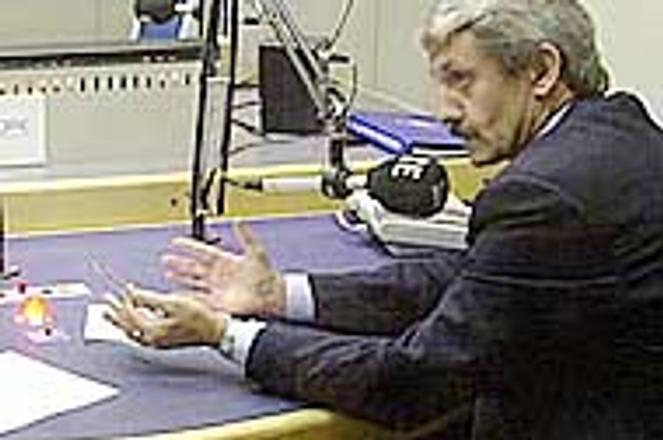PM Dzurinda (right) says journalists just don't understand.photo: TASR
PRIME Minister Mikuláš Dzurinda recently attacked Slovak journalists for being unethical and for what he suggested was an absence of professionalism in their work.
The PM's criticism was bracketed by two court rulings awarding politicians damages for newspaper libel (see article this page), raising the stakes, as fall elections approach, in relations between the two camps.
Dzurinda, whose SDKÚ party is well under 10 per cent in the polls and has been savaged by the media for corruption and broken promises by his government, addressed his criticism to the Slovak media in general.
At a May 16 press conference he scorned journalists for what he called their "skepticism", saying he thought they were offering the public an unjustifiably critical view of the true situation. He said he often felt he was reading "unusual headlines, incredible headlines, as if I was living in a different country."
"If I were to judge from the stories in the media, I would have to think that honesty, responsibility and truth don't pay and that in Slovakia populism and alibism still pay better. More respect and attention is given to nonsense about how nothing has been achieved and how Slovakia is heading in the direction of Argentina, than is given to a sober look at events," Dzurinda said.
Zlatica Puškárová, a reporter with the private Markíza TV, was one journalist singled out by Dzurinda as an example. Puškárová had reported on Dzurinda's recent meeting with members of the Slovak elite, but her TV aired the story two days later. The PM called the decision "incorrect".
The reporter later said she thought that Dzurinda was on the defensive because of the nearing general elections, and added that overall, "communication between his [Dzurinda's] cabinet and reporters cannot be compared to that of [former PM Vladimír] Mečiar. Today it's easier for journalists to do their jobs."
Last month, visiting western journalists under the European Union's Phare programme suggested that Slovak journalists needed to improve their professional skills. While saying they accepted such views, local journalists said they felt it was unfair of Dzurinda to blame all media for critical stories about his cabinet's performance.
"No responsible journalist would say that all politicians are the same, and therefore it's not right to say that all journalists are doing bad jobs," said Stanislava Benická, head of the Slovak Syndicate of Journalists (SSN).
Grigorij Mesežnikov, head of the Institute for Public Affairs think tank, said he understood why Dzurinda might not agree with the media's interpretation of reality, but remarked: "It's unfortunate that he accused journalists of incorrect methods. No politician ever wins a battle with the media in this way."
In the run-up to the 1998 election campaign, the Paczelt PR agency employed by Dzurinda's then-SDK party was found to have offered many Slovak journalists bribes for writing sympathetic stories.
Local reporters have since said that even journalists not on the Paczelt 'list' may have unconsciously given positive coverage to Dzurinda's efforts to defeat authoritarian Prime Minister Vladimír Mečiar.
While the relationship between the media and the Dzurinda government has cooled considerably, Benická said government co-operation with the media remained dramatically better than under the Mečiar cabinet.
The Mečiar government, Benická said, had selected journalists to whom they provided information, and cancelled government press conferences in early 1998.
A 1999 report by the head of the Slovak secret service also recorded that during the 1994-1998 Mečiar period, several journalists had been followed by agents. International press institutions such as Freedom House described Slovakia at the time as a country with partial freedom of the press.
However, Oscar Mascarenhas, the president of a Portuguese journalist ethics council visiting Slovakia, said his team had still found "many defects in the news, headlines which are not headlines but opinion, articles that don't say what, where, when or why, journalists that don't talk to the people they are accusing."
Danish journalist Peter Tygessen added: "I'm not saying that the Slovak media are very bad. I think journalists often do what they do because of their dedication to Slovakia. It seems, however, that they don't quite understand the rules."


